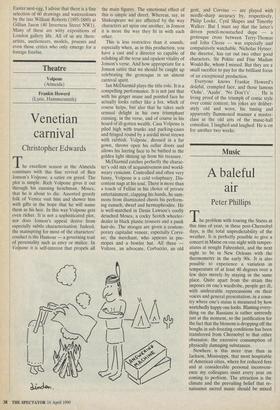Theatre
Volpone (Almeida) Frankie Howerd (Lyric, Hammersmith)
Venetian carnival
Christopher Edwards
The excellent season at the Almeida continues with this fine revival of Ben Jonson's Volpone, a satire on greed. The plot is simple. Rich Volpone gives it out through his cunning henchman, Mosca, that he is about to die. Assorted greedy folk of Venice visit him and shower him with gifts in the hope that he will name them as his heir. In this way Volpone gets even richer. It is not a sophisticated plot, nor does Jonson's appeal derive from especially subtle characterisation. Indeed, the mainspring for most of the characters' conduct is the Humour — a governing trait of personality such as envy or malice. In Volpone it is self-interest that propels all the main figures. The emotional effect of this is simple and direct. Whereas, say, in Shakespeare we are affected by the way characters act upon one another, in Jonson it is more the way they fit in with each other.
This is less restrictive than it sounds, especially when, as in this production, you have a cast and a director so capable of relishing all the terse and opulent vitality of Jonson's verse. And how appropriate for a Jonson satire that we should be caught up celebrating the grotesque in an almost carnival spirit.
Ian McDiarmid plays the title role. It is a compelling performance. It is not just that with his ginger mane and pointed face he actually looks rather like a fox, which of course helps, but also that he takes such sensual delight in his own triumphant cunning, in the verse, and of course in his hoard of ill-gotten wealth. Casa Volpone is piled high with trunks and packing-cases and fringed round by a sordid moat strewn with rubbish. Volpone, dressed in a fur gown, throws open his cellar doors and allows his leering face to be bathed in the golden light shining up from his treasure.
McDiarmid catches perfectly the charac- ter's odd mix of acquisitiveness and world- weary cynicism. Controlled and often very funny, Volpone is a cold voluptuary. Dis- content nags at his soul. There is more than a touch of Fellini in his choice of private entertainment; clapping his hands, he sum- mons from illuminated chests his perform- ing eunuch, dwarf and hermaphrodite. He is well-matched in Denis Lawson's coolly detached Mosca, a cocky Scotch wheeler- dealer in black plastic trousers and a punk hair-do. The stooges are given a contem- porary capitalist veneer, especially Corvi- no , the merchant, who appears in pin- stripes and a bowler. hat. All three — Voltore, an advocate, Corbaccio, an old gent, and Corvino — are played with needle-sharp accuracy by, respectively, Philip Locke, Cyril Shapes and Timothy Walker. But I must say that the latter's driven pencil-moustached dupe — a grotesque cross between Terry-Thomas and John Cleese — was especially and compulsively watchable. Nicholas Hytner, the director, has cut out two other good characters, Sir Politic and Fine Madam Would-Be, whom I missed. But they are a small sacrifice to pay for the brilliant focus of an exceptional production.
Everyone knows Frankie Howerd's doleful, crumpled face, and those famous `Oohs', `Aaahs', `No Don't's' . . . He is living proof of the triumph of comic style over comic content; his jokes are deliber- ately old and worn, his timing and apparently flummoxed manner a master- class in the old arts of the music-hall comedian. I laughed and laughed. He is on for another two weeks.


















































 Previous page
Previous page